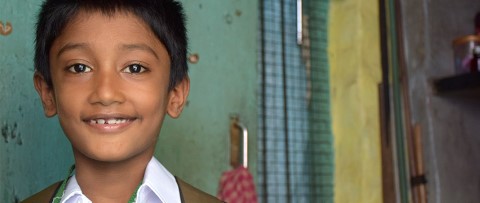- Thought Leadership
- Zambia

Adrish, 6, and his family struggled to find a kindergarten in India’s competitive education system.
“We were very worried about getting Adrish into school,” Shanti confides. Like so many in Kolkata, India, she and her husband knew that navigating the lottery system to find their young son a decent and affordable school would be an uphill battle.
“At each school, there would be long, winding queues,” Shanti recalls. “For 45-50 seats, the school was receiving some five to six hundred applications. Parents would push and shove others to get the forms first, and then they’d battle to be the first to submit them. People would come as early as 4 a.m., even when the school counters only opened at 10 a.m.!”

While schools in India are notoriously crowded, like this classroom outside Kolkata in Raichak, competition to get into schools is fierce.

Schooling in India is complicated — even more so for families living in poverty.
But — even after braving determined parents and endless lines — rejection after rejection came for Adrish. Hindu Boys’ School? Declined. David Hare School? No. Sanskrit School? Nope.
“It was a pathetic situation,” Shanti admits. “Each time the lottery results were drawn, I cried and was so upset, wondering what had happened and what would happen to my son. I was worried about his future.”
You practically need a Ph.D. to get an education for your child in India. It seems simple: Schools are split into one of two tiers, public or private. But navigating the challenging system is complicated. Some schools are semipublic, for example, leading to huge differences in cost and admission requirements.
While all families scramble to get their children into school, no child is guaranteed a spot — especially those with little influence or funds. Instead, families struggle like Adrish’s did — applying to school after school and hoping their child will be one of the lucky few.

Overburdened and competitive, there’s little room for the unprepared.
Making matters worse, because it’s a brutally competitive environment, it’s critically important that Indian children enter the classroom ready to learn. But that’s no easy task — especially for the poor who lack the resources to adequately prepare their preschool-aged children. Although the Indian government makes preschool options available, the program isn’t universal. And it doesn’t always yield good results.
Yet the advantages of early education are staggering. About 80 percent of brain development takes place by the time a child is 5. And the first three years show the most growth. It’s an easy conclusion to make: Preschool, as you can see, is unbelievably important for Indian kids.
ECD gets Adrish — and kids like him — ready for the classroom.

With support from the Guru Krupa Foundation, though, hundreds of CI kids in India get a head start to their education in our Early Childhood Development (ECD) program. The program creates rich opportunities for learning and growth through early math skills and language development — in both English and Hindi or Bengali, depending on the location. Health and social skills are also taught.

Happily, Adrish’s story has a happy ending. He finally landed a spot at a government-run school. And, thanks to CI’s preschool program, the 6-year-old has really shined.
“Have a look at his results!” Shanti encourages us. “You will notice he is doing really very well for his classwork and gets ‘smilies’ almost every day! This is all because he had great training in the ECD classes.”


Families often tell us they’ve started healthy habits at home after their kids learn them in the classroom.
Like Adrish, Sanskriti, 6, graduated from the Guru Krupa-underwritten program. Sanskriti had better luck getting into school, though. She was selected out of 600 for admission interview to her school of choice. And, with a strong education in our preschool program, Sanskriti was a standout applicant.
Her mother, Suntali, beams with pride. “Sanskriti performed really well [during the interview]! In fact, the head schoolteacher was amazed that my daughter could recite poetry, sing songs and identify colors without hesitation.
“I was truly thankful to the ECD program and the teachers who helped my daughter learn so much!”
Early childhood education has far-reaching results. And, in Suntali’s case, CI’s program saved her from isolation.
Born in Kathmandu, Nepal, Suntali barely spoke Hindi when she moved to be near her husband’s family. Unable to communicate in any of Kolkata’s common languages, she lived in isolation. When her daughter, Sanskriti, started the ECD program, however, Suntali found that the other mothers gently nurtured her language skills.

“As a parent, the ECD program has also been a blessing for me — most important of all, I did not know a word of Hindi when I had come to Kolkata after my marriage. But over a period of two years, I have picked up a lot of the language. This is because the teachers, other parents and Sanskriti would interact with me mostly in Hindi. It was, indeed, a good learning experience for me, as well.”

The ECD program isn't just academic, though. Preschool-aged kids learn healthy habits and how to be good friends — sometimes at the same time!
Sanskriti, often remembered as a shy toddler, certainly learned from her mother’s example! The little girl is now happily engaged in her community. Suntali comments, “I also like the idea that Sanskriti now has friends, as she is no longer a shy child, and she talks to others. This has been a definitive change.”

This is the third consecutive year the Guru Krupa Foundation has provided funding for the ECD program in India. Mukund Padmanabhan from the Guru Krupa Foundation says, “Funding the Early Childhood Development program run by CI has been a very effective way to get involved in giving impoverished children in India a head start in school and in life, and we at GKF hope that this program will grow and serve thousands of children in the future.”